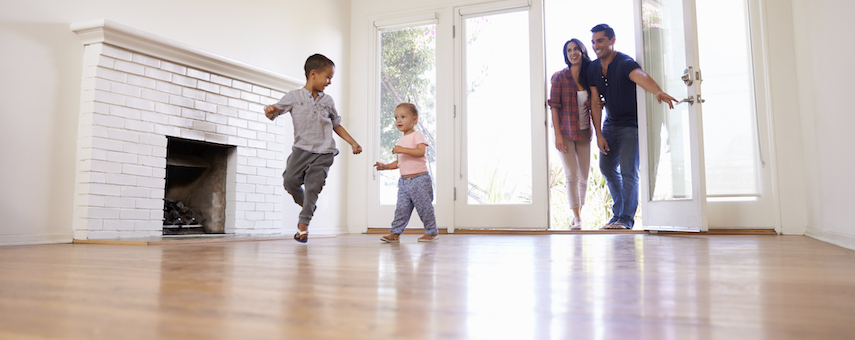Do Hardwood Floors Increase Home Value?

When you walk into a room that has hardwood floors, it’s hard not to notice. The rich color and shine creates an immediate impression on guests, while prospective home buyers notice the longevity and toughness hardwood offers. There are many attractive elements of hardwood floors, but many homeowners wonder about the biggest question; do hardwood floors increase home value? If your floors are due for a rework, you’re probably wondering about the value and ROI of hardwood floors. It’s important to consider several factors in this decision.
Do Hardwood Floors Increase Home Value?
What is the ROI of Hardwood Floors?
Realtors estimate the ROI of wood floors to be between 70 to 80%. However, every home is different, and this number may be higher or lower in some cases. If, for example, your existing floors are damaged or outdated, installing hardwood floors will not only add a valuable feature, but it will also eliminate a problem. In this case, you may see higher ROI than usual. If your floors are already in good shape, you might see more value from making other home improvements.
Will Bad Flooring Drive Away Buyers?
Besides wondering if hardwood floors increase home value, it’s also important to know if they increase interest in a home. Attractive flooring creates a great first impression, and will make more buyers feel more confident about your home. Contrastingly, damaged flooring will immediately give buyers doubts about the home’s upkeep or integrity. Since flooring is usually installed in multiple areas at the same time, this positive or negative impression will follow homebuyers as they tour the house. Damaged flooring might drive some buyers away if they’re not ready to tackle the job, and interested buyers will factor this expense into their offer.
Should All Rooms Have Hardwood Floors?
Hardwood floors are more valuable in some rooms than others. Hardwood floors in high-traffic areas like living rooms, dining rooms, and kitchens will increase value more than hardwood floors in bedrooms. It is also important to consider where the flooring starts and stops. Hardwood floors will increase value the most if they cover a continuous area. If carpeting meets hardwood in an obvious location, such as between the kitchen and living room, the flooring will be less valuable.
What is the Price Point of the House?
When considering how much value hardwood floors will add to your home, it’s important to consider the price of the home itself, as well as the features of comparable homes. If your home is located in a high-price neighborhood, it’s a good idea to look for high-quality flooring. However, if your home is more affordably priced, top-quality flooring probably won’t yield high ROI.
Let’s look at an example. Hardwood floors can cost anywhere from $5 to $10 a square foot to install. Say you choose a top-quality hardwood with expert installation for your 1,000 square foot living room and kitchen, and this totals $10,000. In a $100,000 home, this is 10% of the home’s total value. Hardwood floors are unlikely to increase the value this much, so your ROI will probably be lower. You would achieve higher ROI with a cheaper flooring option, such as engineered wood or laminate. However, in a $300,000 home, this is only about 3% of the home’s total value. A 3% increase in home value isn’t unrealistic, so you’re likely to get more out of this investment. In this case, a cheaper flooring option might make the home less competitive in the neighborhood. Whichever option you choose, it’s a good idea to look at comparable homes before making a decision.
Does Hardwood Flooring Make Sense in my Climate?
Hardwoods will start to mold and rot in wet conditions, which is why they aren’t recommended for basements or other areas with high moisture. This is also why homeowners in humid climates, like those in Florida and nearby areas, tend to look for other options. However, Michigan’s temperate climate doesn’t generally create challenges for hardwood floors. You’ll want to protect hardwood floors in areas that see more moisture, such as entry ways, and use protective mats for drying out snow boots or umbrellas.
Hardwood floors can increase your home value and interest in your home, but it’s important to consider all of the factors. If you’re preparing to sell your home and you’re not sure if the extra investment is worth it, talk to a professional. A Realtor can help you weigh your options and choose home improvements with the highest value.

